A “One-Of-A-Kind” Team: An Interview with WEPOWER’s Community Wealth Building Team
March 30, 2022
A “One-Of-A-Kind” Team: An Interview with WEPOWER’s Community Wealth Building Team
WEPOWER’s Community Wealth Building team came together with interviewer Whitney Bembenek to share about their backgrounds, personal visions, superpowers, and the meaning of their work. The team leads WEPOWER’s three entrepreneurship-based initiatives: WEPOWER Accelerator, an entrepreneurship support and growth program; Kiva Loans, a partnership which offers crowd-sourced 0% interest loans up to $15K; and their new investment fund, WEPOWER Capital, which provides investments up to $200,000 in flexible, owner-friendly terms. The Accelerator and Capital fund are exclusively for Black and Latinx entrepreneurs in the St. Louis region.
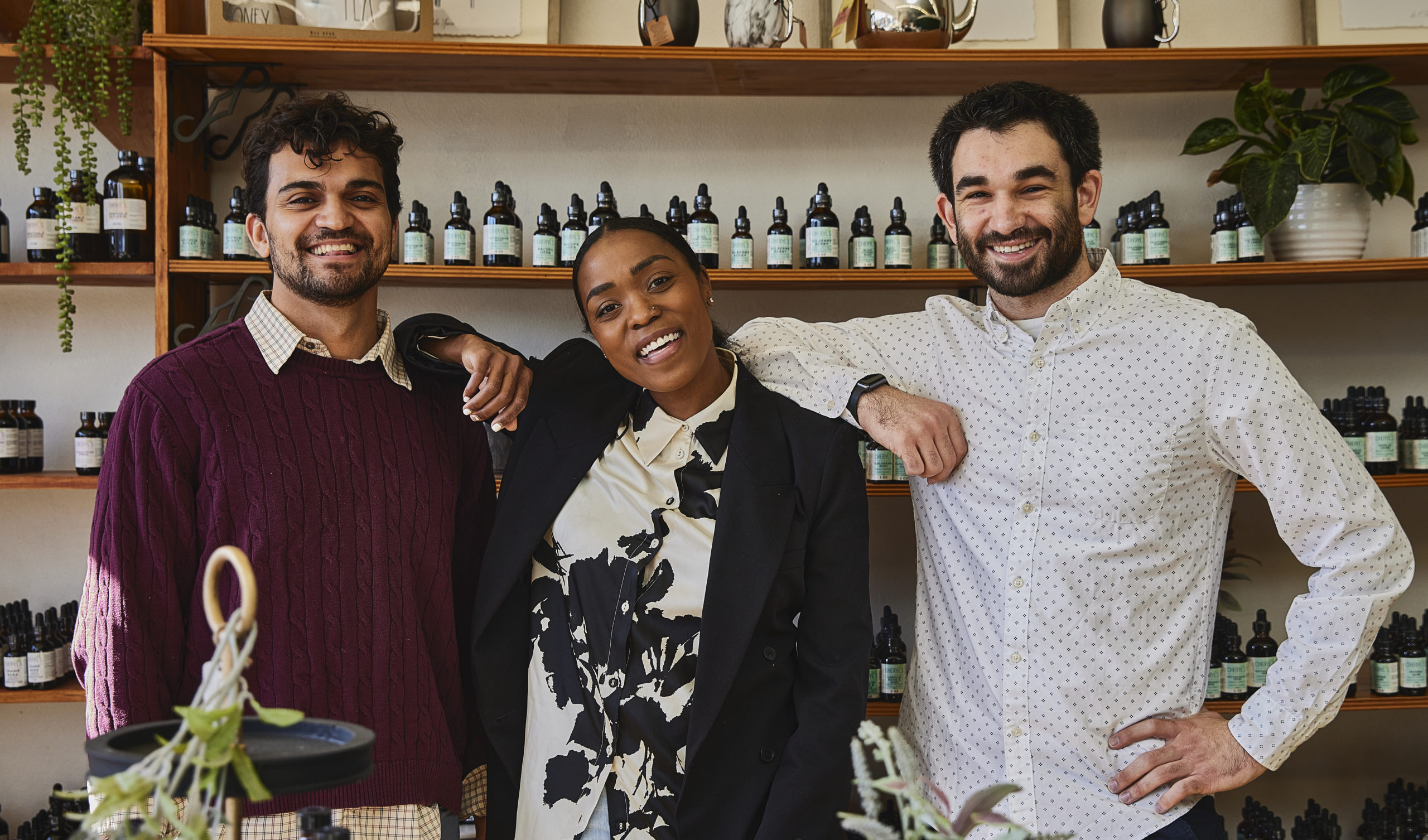
Meet the Community Wealth Building team: Edgar Payano, Keisha Maybry Haymore, and Yoni Blumberg. The team poses among the plants and tinctures of one of their entrepreneur alum’s shops, Cheryl’s Herbs. Photo by Izaiah Johnson.
WB: What is a quote that embodies the vision you hold for yourself and your work with WEPOWER?
Keisha: My quote is from Alice Walker: "The most common way people give up their power is by thinking they don't have any." It hits me hard, because often I struggle with knowing my own power. Just in recent years I started having examples of power near me, and it’s been so possibility-opening.
Yoni: Dr. Martin Luther King Jr. said, "We must recognize that we can't solve our problem now until there is a radical redistribution of economic and political power." This quote is over 50 years old, but it feels like it could have been spoken yesterday.
Despite a lot of rhetoric, I sense that things fundamentally have not changed–at least not enough. As for the non-profit sector, often non-profits address systematic problems with direct service, and this distracts us from the root causes. I never want our work to play that role, and I believe that WEPOWER’s work can move us towards a significant, radical redistribution of power–both economic and political.
Edgar: The scholar and historian of Malcom X, Zaheer Ali, said, “When we focus so singularly on individuals, we lose sight of the communities that gave birth to them.” This quote really speaks to me because I think context is always important; you have to know where a person is coming from.
At WEPOWER, our culture and our work with community residents pushes us to understand, “how can we elevate the strengths of each person to cultivate and direct each of our efforts towards a communal vision that is larger than any individual?”
Here in St. Louis, there is a strong narrative that the city is fractured, which has a political and social impact. For this reason, we are thinking expansively about the different communities that need to be in conversation to create a thriving future. In my eyes, we are seeking answers to the following questions: how can we deepen our relational work? Who is ready and willing to join us in this transformational journey?
WB: Tell me about your earliest memory of economic injustice and/or the importance of building wealth. When did you start realizing that building wealth is important?
Keisha: For me, college was always the path to economic mobility and sustainability, and my family didn’t have the means for me to go to college. I applied for so many scholarships–over 30. And I think I got like ten of them. It was a lot of work.
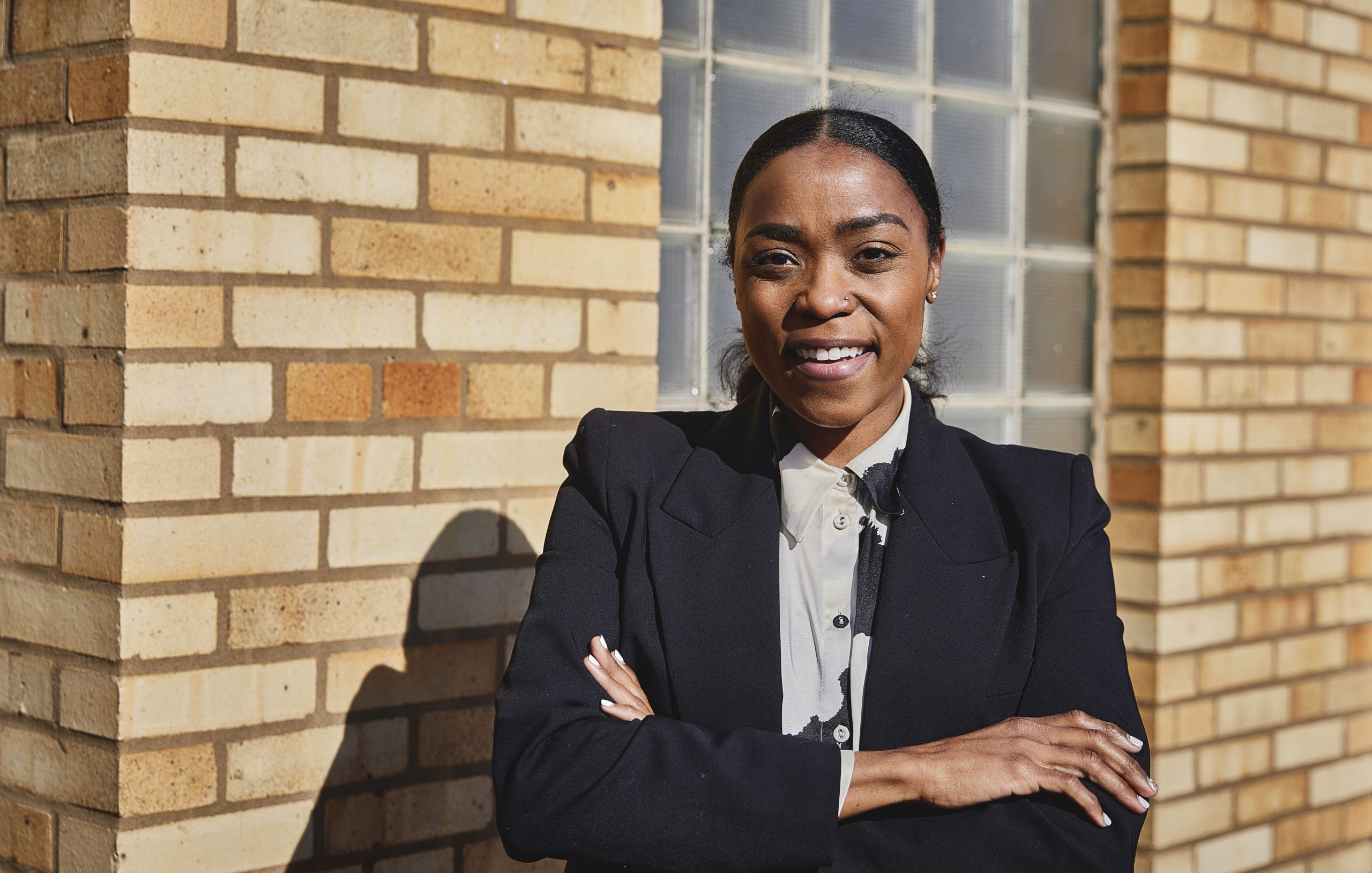
According to her teammates, Keisha’s superpowers are almost too many to name: She has theory and practice, as well as practicality and empathy. She has radical candor. She can push on an idea with directness and confidence, while maintaining an environment where people feel safety and dignity. She is an excellent communicator in all kinds of settings. Photo by Izaiah Johnson.
My scholarship reimbursement check was the first time I had that much money in my life–ever. With it I opened a bank account and bought my first car. And through all of those steps I was thinking, “Gosh, does everyone have to struggle so much?”
Fast-forward to graduating from college: my goal was always to get more education, because I thought getting more education I could make more money. And by making more money, I could start to build wealth.
I started getting a window into wealth and wealth-building strategies around the time I graduated from grad school. My mom was getting into the financial industry, and she’d come home and tell us stories about her work. We learned all sorts of things together. The first thing I remember her talking about was retirement and investing. I was in my 20s at the time, and I had never really heard of those things before.
When I got my first job, I remember thinking, “Okay, now I have to start investing in my retirement account.” But it was also more than that. It was, “Shoot, I’ll have to start saving for my wedding, too. And also for buying a house...”
The same was true for all of my friends, too, and it wasn’t until I was in my 30s that I met people who had different financial realities than me. People whose parents paid for college, bought their cars, bought their houses, and paid for their weddings. Even grandparents setting up investments for their grandkids when they’re just babies.
Getting exposed to these other realities exposed me to so much. “Wow, this is crazy,” I thought. “If I wouldn’t have had to pay for all of this stuff on my own, the amount I could have been investing in retirement would be insane.” What an extreme difference having generational wealth can make.
Edgar: This question gets me thinking about material conditions and the things that I would see versus what others would see. Growing up among my close friends, I was consistently the only person who lived in an apartment. I am a product of public schools, and most folks in my school had a house and a two-parent household. They also mostly had two parents that could drive, pick them up and drop them off at places, and who could prepare them sack lunches at home.
I was always on free lunch, regularly took the school bus, and had to get off-brand school supplies instead of the cool main brands. I didn’t have the language for it at the time, but through all this I could tell that my friends and I were clearly starting off from different points.
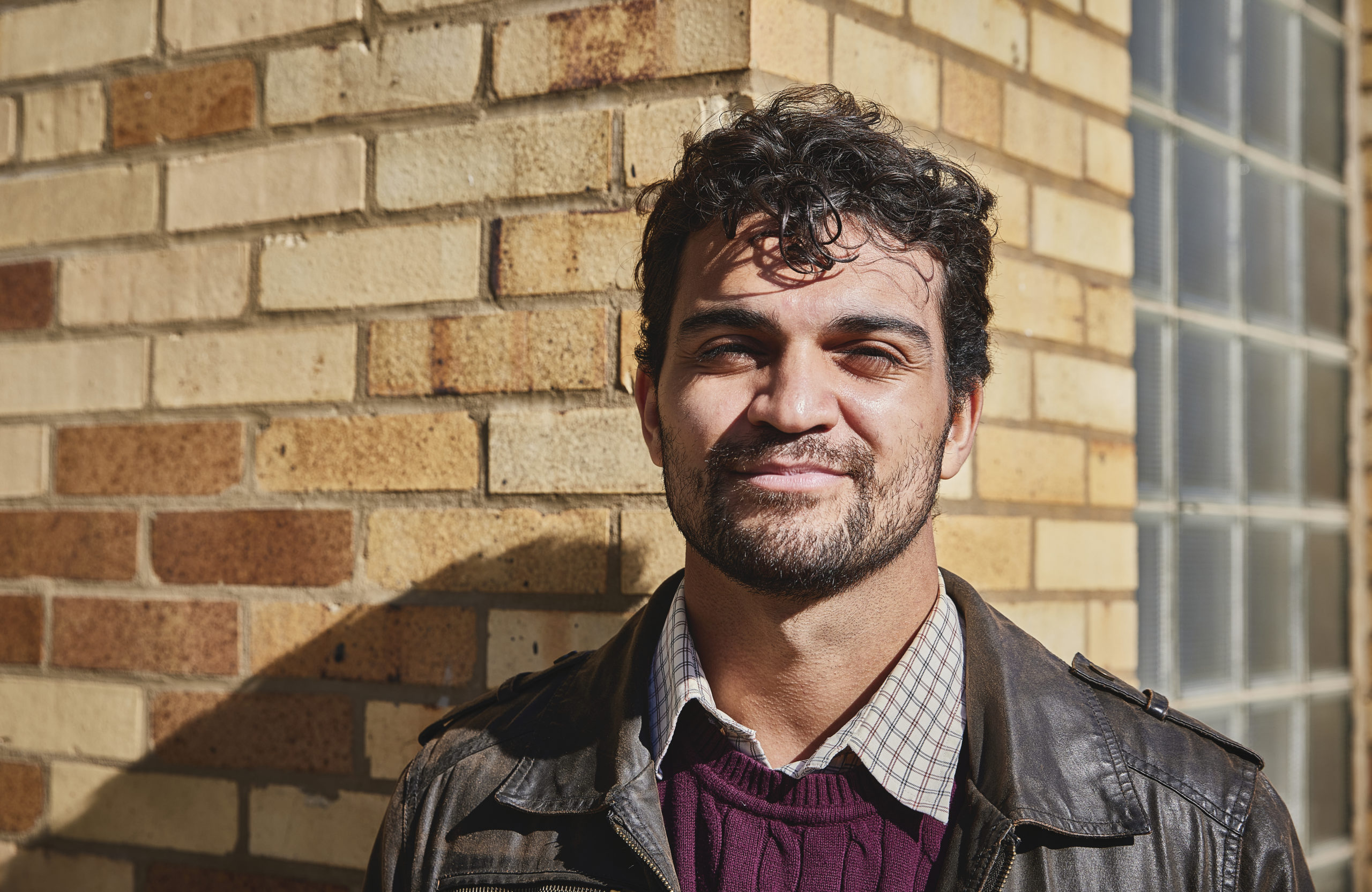
Edgar’s superpowers center around his thoughtfulness–his ability to listen and think with depth and nuance, and always keep the person in mind. He considers context and consequences. “If our work shifts, what happens to the people we are already working with?” Photo by Izaiah Johnson.
You know how in elementary school, every time a new school year comes around the teacher sends out a list of supplies that you’ll need for the class? There’s the list of ‘non-negotiables’ and then also the “nice-to-haves”, like bringing in a tissue box for your classroom? Man, I wanted to bring a tissue box for my class so bad.
But how could I ask for a tissue box for my class when I didn’t even know if I could buy Crayola crayons? ‘Cause you know there are Crayola crayons and also off-brand ones, and I would get the off-brand. At school I was so scared to pull them out because I felt so judged about my background and socio-economic status.
Another thing I felt but didn’t have the words for at the time was the obligation or pressure to support elders in the family. I didn’t sense many of my fellow students experienced this, but for me, the expectation of always looking out for your family, whether you make it or you don't, was built into me very early on. It’s a voice that says, “Okay, when you graduate from college and you get a good job, make sure you look out for your mom, make sure you look out for your dad, make sure you look out for your grandma…” and so on.
Nowadays in my work, as I help cultivate sustainable community wealth building practices, I’m regularly asking, “What does that mean to build community wealth in a way that doesn’t sacrifice oneself for everybody, but actually amplifies everybody?”
Yoni: My early experiences with wealth are similar to a fish being in water. Until you get out of the water, you don’t notice the water around you. For me, wealth of varying degrees was present while I was growing up, so I wasn’t aware of its existence and importance until I started having experiences that “got me out of the water.”
A game-changing moment for me happened when I was in fifth grade. A guest speaker came into our class who had spent a lot of his youth enslaved as a child in Sudan. He told us about some of the experiences he had at age 11 and 12, which was almost the same age as me at that time. It got me thinking about what I now understand to be the lottery of birth.
At the time, I thought, "Oh, I could have been born in his position, but I somehow was born here, with this totally different set of life circumstances! This is super unfair.” I began to see how the range of resources and experiences different people have in this world is incredibly dramatic and very unjust.
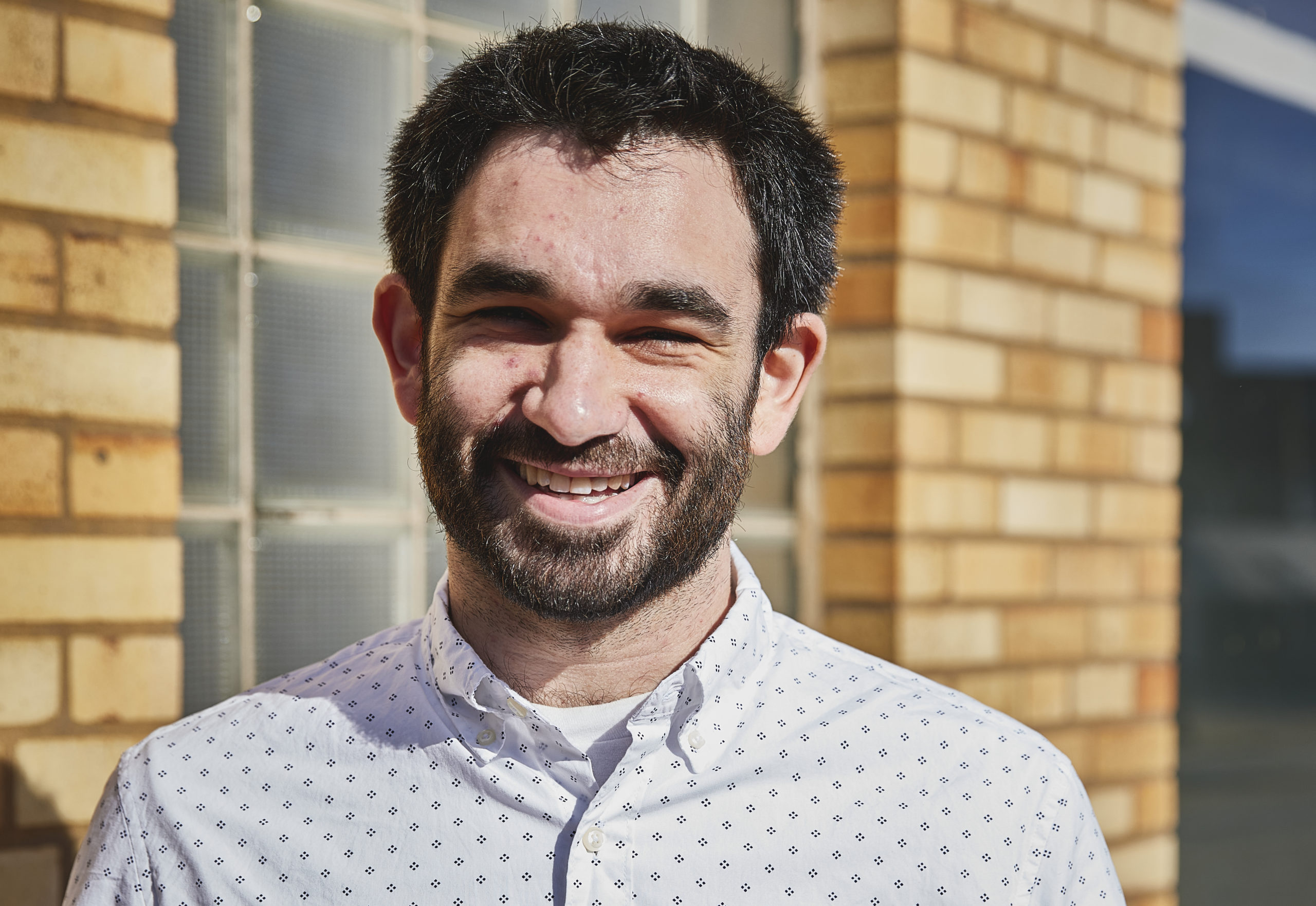
Yoni’s superpowers: Persistence and radical imagination. “Living in St. Louis and working at WEPOWER has enabled me to tap into my radical imagination more…and tap into a belief in abundance. We can build a shared vision, raise the money, find the right people, and create what we believe is needed.” Photo by Izaiah Johnson.
WB: Why do you believe we need more leaders of color?
Edgar: What’s possible with more leaders of color is a sense of affirmation, validation, and a belief in the same type of future. It’s knowing that as soon as you step into a professional space, you don’t have to explain things that are obvious to others outside of that space. You won’t have to use energy responding to the internal voice that asks, “Why is that such a big deal?”
But I also want to push back on this question. It hasn’t been my experience that people who have similar identities and communities as I do necessarily have the same values. I operate with the understanding that “all skinfolk ain’t kinfolk, ” and we need to be striving for higher expectations that recognize race, yet also aren’t limited to its implications.
Keisha: For me, there’s no narration without representation because we can only speak our own truths—nothing but it. So if we want to truly solve injustice, inequity, and dismantle unsustainable systems, we have to include leaders of color. We must.
And to do so, people with power and privilege need to relax into the real personal and societal benefits of sharing, giving up, and shifting their power.
With more quality representation by leaders of color, people in communities of color can and will increasingly recognize that we have power. Then, more expansive, creative, and inclusive solutions can be formed.
Yoni: Like Keisha said, I think it’s universally better to have more guidance, input, and decision-making controlled by people closest to an experience, no matter what you’re designing for.
Many majority-white countries in the world, and this country in particular, have intentionally deprived themselves of the benefit of the insights and wisdom of people of color for far too long. And that’s something that we are in a position to stop doing whenever we want. And when we choose that, we will all reap the benefits of it.
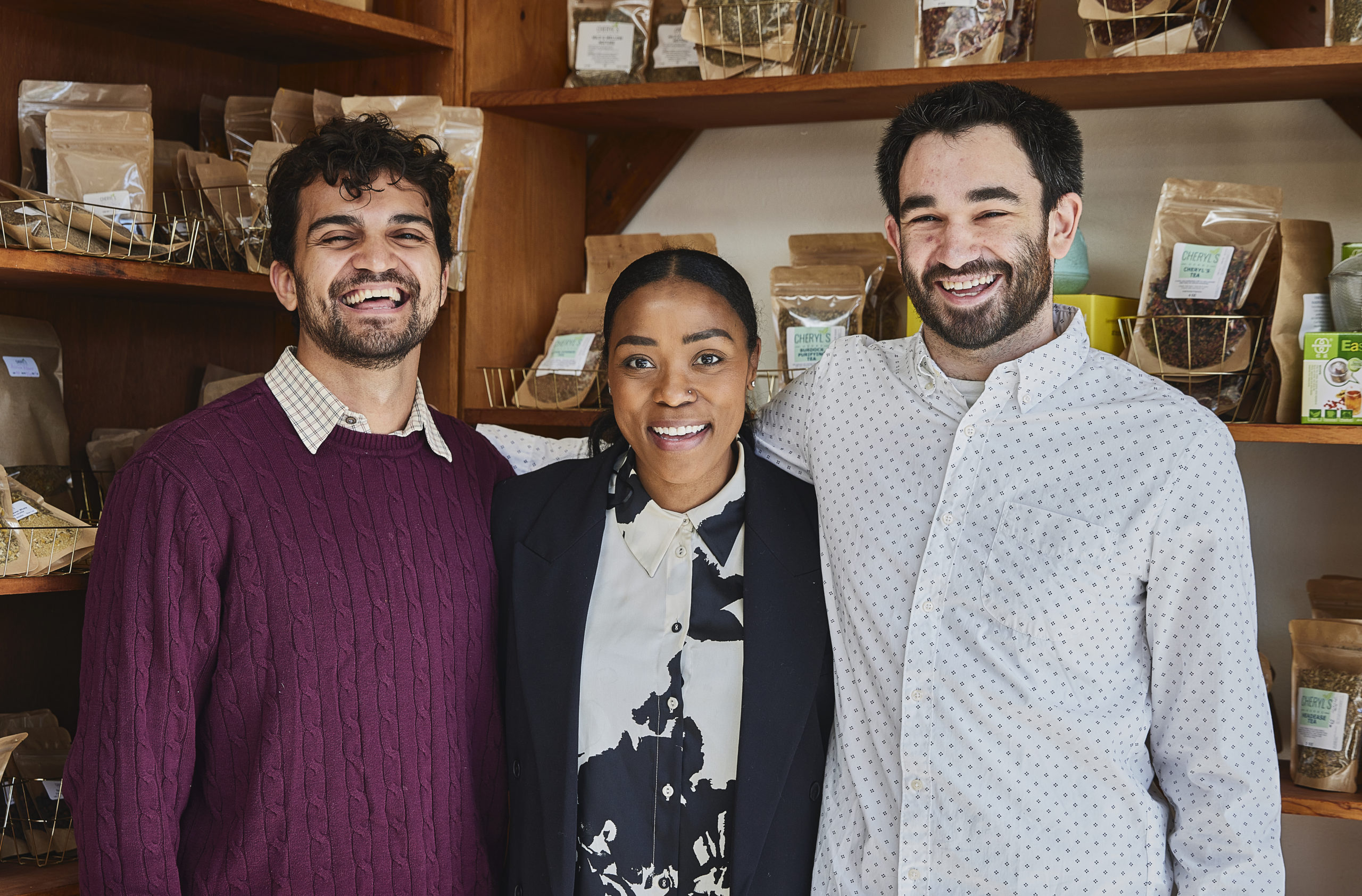
“I'm so thankful to be on a team such as this, tackling a problem as big as this. With our three heads together, we're going to execute and make something happen that's going to impact Black and Latinx communities in a beautiful way. In a way that needs to happen.” -Keisha
WB: A lot of WEPOWER’s work is rooted in radical imagination, which can be defined in various ways:
• “The ability to imagine the world, life, and social institutions not as they are but as they might otherwise be.”
• “The courage and the intelligence to recognize that the world can and should be changed.”
• “[It is] not just about dreaming of different futures. It’s about bringing those possibilities back from the future to work on the present, to inspire action and new forms of solidarity today.”
What does radical imagination mean to you?
Yoni: So often, I feel like people’s energy goes into solely fighting the bad. But in addition to dismantling harmful systems, we need compelling visions of what we are going to build that drive us towards something wonderful and worth working for. It urges us to envision, and be expansive about the future we can create.
My radical imagination sees a solidarity economy–an economy that centers the well-being of people and the living systems with whom we share the planet. My work, WEPOWER’s work, and the work of so many others around the globe is planting the seeds and building a foundation for the solidarity economy. And through our combined successes, we help show others how else the world can be when we do things differently.
Edgar: Radical imagination puts relationships and trust front and center. However, on the surface this doesn’t mean very much. For example, if you put yourself in civic, political, or for-profit spaces, you’ll hear some version of, “Relationships are important. Relationships are everything. It’s who you know that matters.”
To this, though, I ask, “If we all agree that relationships are important–are we all approaching relationships the same way?” I don’t think so.
In the entrepreneurship space, I’m talking about a whole different way of doing business and approaching capital. It’s not only putting your money where your mouth is, but being aware of and invested in the formation and essence of your relationship.
Sometimes I hear entrepreneurs say things like, “I don’t want an angel investor who just gives me money. I want them to also be a thought partner, to give me advice, and to really be a champion for me.”
For us as leaders, facilitators, and investors, it’s saying to our entrepreneur partners, “I know you. I believe in you, and I believe in your business.” It’s also saying, “We are both choosing to have skin in this game, so if you are struggling, let’s talk through what’s going on and find a way to keep advancing together.”
It’s so much more of a nuanced conversation than just, “who you know.”
Keisha: Radical imagination for me is the power to dream. And to even know that you have power. We talk about this often on our team.
Too regularly I see that as oppressed people, we are expected to be the radical thinkers and fix the problems when we didn't even put ourselves in the situations to begin with. I often feel like our radical thinking is limited because of our exposure–our upbringing, our experiences, and the sparse examples we’ve been shown of what is even possible.
As silly as it may sound, I have watched Black Panther probably more than 10 times because Wakanda has been the closest thing to radical that I’ve seen. Every time I watch this, I smile so hard–it has just brought me so much joy. I'm like, “Can this exist outside of a movie screen? What else can exist outside of a movie screen?”
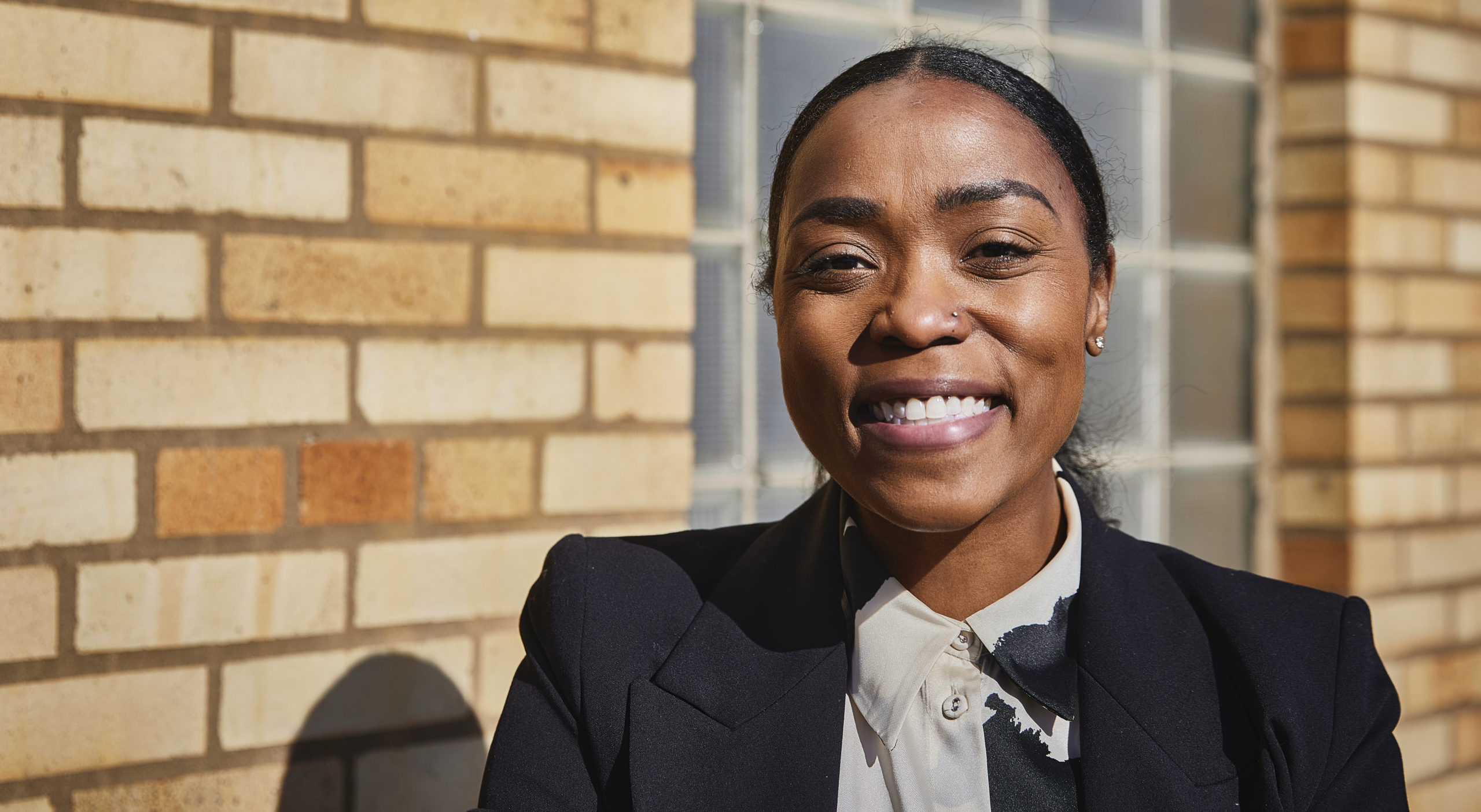
Photo by Izaiah Johnson.
Wakanda helps me hold space for my radical imagination while our team–and so many others worldwide–are constantly exploring, investigating, and co-creating new systems of wealth and abundance for everybody as we speak. Oh my gosh, I'm getting excited right now just thinking about it, because I know it’s possible.
***
Join Keisha, Yoni, and Edgar in bringing a more radically powerful future to reality by applying to work with WEPOWER.
Written in partnership with Whitney Bembenek.
